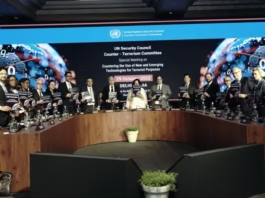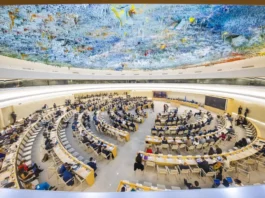Introduction to the Security Council Meeting
The recent Security Council meeting convened to discuss vital aspects regarding the renewal of the United Nations Interim Force in Lebanon (UNIFIL) stands as a crucial moment in the realm of international peacekeeping efforts. This session is pivotal as it delves into the ongoing security situation in Lebanon and the operational efficacy of UNIFIL in maintaining peace and stability in the region. The discussions centered on the force’s mandate, which has played an instrumental role in mitigating tensions along the borders and fostering dialogue between conflicting parties.
In light of the financial liquidity crisis impacting many UN operations, there are pressing concerns about the sustainability and funding of peacekeeping missions, particularly UNIFIL. The implications of such a crisis are far-reaching, potentially affecting troop deployments and the overall effectiveness of peacekeeping initiatives. The Security Council must navigate these challenges while ensuring that UNIFIL remains equipped to fulfill its mandate effectively. During the meeting, council members engaged in substantial dialogues regarding the renewed financial commitments necessary for the continuation of UNIFIL’s operations in a region that has experienced prolonged instability.
This meeting is particularly significant as it sets the stage for discussions scheduled for August 29, where a more comprehensive analysis of UNIFIL’s future will be presented. The outcomes of this forthcoming session are expected to shape international strategies for peacekeeping in Lebanon and could redefine the operational framework of UNIFIL, impacting not just geopolitical dynamics but also the lives of local populations relying on the force’s presence for security and stability. As such, the decision made during this meeting carries substantial weight in the context of global peacekeeping efforts and regional diplomacy.
The Extension of UNIFIL’s Mandate
The United Nations Interim Force in Lebanon (UNIFIL) plays a crucial role in maintaining peace and stability along Lebanon’s southern border with Israel. Established in 1978, UNIFIL was initially tasked with overseeing the withdrawal of Israeli forces after the Lebanon war, among other responsibilities. Over the decades, its role has evolved, particularly following Hezbollah’s rise and periodic conflicts in the region. Today, UNIFIL’s mandate focuses primarily on monitoring these critical borders, ensuring that they remain free from hostilities, and assisting the Lebanese Armed Forces in extending their authority in the area.
The recent decision to extend UNIFIL’s mandate until the end of 2026 comes as a significant move to reinforce the mission’s ongoing efforts at safeguarding peace in a volatile region. The current mandate was set to expire on August 31, emphasizing the urgency of the vote to ensure continued operations without interruption. This proactive approach by the Security Council reflects an understanding of the complex dynamics that characterize the Lebanese situation, where geopolitical tensions necessitate a consistent and robust international presence.
The extension signifies the international community’s commitment to supporting Lebanon amid ongoing instability and the potential for escalation. It ensures that UNIFIL remains operational and can continue to implement its core functions, including patrols and monitoring activities, to deter any violations and promote a climate of security. The Security Council’s decision underscores the importance of maintaining peacekeeping efforts and highlights the necessity of international cooperation in addressing security challenges that affect the region.
Key Resolution and International Involvement
The recent deliberations within the United Nations Security Council surrounding the future of the United Nations Interim Force in Lebanon (UNIFIL) have navigated through a complex web of international relations, particularly underscored by a French-drafted resolution. This proposed resolution, expected to receive support from various member states, represents a significant shift in the international community’s approach to maintaining peace and security in Lebanon. A notable feature of this resolution is its compromise with the United States, indicating a concerted effort to align international policies towards Lebanon.
One of the central components of the resolution is the stipulation that UNIFIL will complete its operations by December 31, 2026. This timeline not only marks a definitive endpoint for the mission but also raises critical questions regarding Lebanon’s capacity to manage its security independently. The withdrawal of UNIFIL will necessitate a robust analysis of Lebanon’s internal security strategy and its implications for regional stability. The potential vacuum left by the exit of international forces could lead to an increase in the responsibilities of the Lebanese armed forces and other local security mechanisms.
Furthermore, the international involvement in shaping this resolution highlights the intricate balancing act among the Security Council members. The tension between maintaining peace in Lebanon and addressing broader geopolitical interests reflects the difficulties of coordinating a comprehensive security approach. External actors, including neighboring countries and international allies, can influence Lebanon’s security landscape, thereby affecting its national sovereignty. Thus, the implications of this resolution extend beyond military considerations, touching upon diplomatic engagements and regional dynamics as stakeholders reflect on their roles in the evolving situation in Lebanon.
Future Outlook and Regional Stability
The recent decision by the Security Council regarding UNIFIL’s future in Lebanon raises significant questions about the trajectory of regional stability and security dynamics in southern Lebanon. UNIFIL, established to promote peace and security along the Lebanon-Israel border, has played a pivotal role in mitigating tensions and fostering cooperation among various stakeholders. As the mission’s operations face potential alteration, the implications for Lebanon’s southern region could be profound.
The withdrawal or scaling down of UNIFIL’s operations may lead to an escalation in security challenges. Local factions and regional actors could exploit the vacuum, increasing the potential for violence and conflict. For instance, the absence of a neutral international presence might embolden certain groups, leading to intensified clashes or provocations. Consequently, a surge in instability may disrupt the current fragile peace, posing a threat not only to Lebanon but also to neighboring countries.
However, the end of UNIFIL’s mandate could also present an opportunity for Lebanon to assert greater control over its security landscape. Strengthening the Lebanese Armed Forces (LAF) could be a priority for the government, fostering a sense of national sovereignty. The LAF’s enhancement, in terms of capabilities and resources, may alleviate some security concerns, demonstrating Lebanon’s commitment to maintaining stability within its borders.
Moreover, the international community’s response will be crucial in determining the future security dynamics in the region. Continued support and cooperation from multilateral organizations and nations can help Lebanon navigate potential challenges. Diplomatic efforts, peacekeeping initiatives, and development programs are essential in ensuring that Lebanon transitions smoothly into a more self-sustaining security framework. In this context, the focus will be on how Lebanon can incrementally take charge while maintaining harmony and avoiding conflicts that may arise in the absence of UNIFIL.




